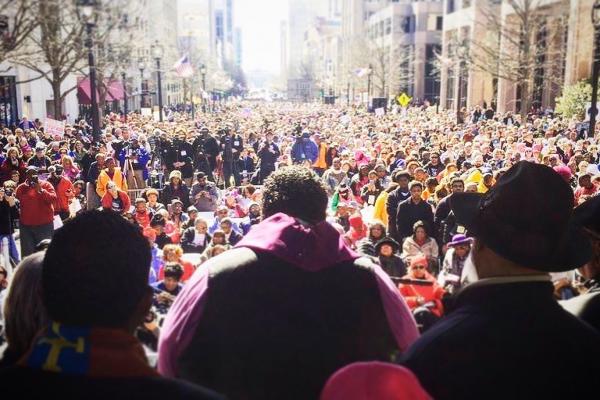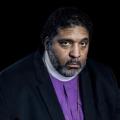On Feb. 11, more than 80,000 people gathered in Raleigh, N.C., for the largest Moral Monday march yet — challenging Trumpism in Washington, D.C., and legislative overreach in our state. More important than the numbers, though, are people’s convictions: Principle, not party, is the reason why we march.
We march because our deepest religious traditions have trained our bodies to stand up in the face of injustice.
The prophet Isaiah declares:
Woe to you who legislate evil,
who make laws that make victims—
Laws that make misery for the poor,
that rob my destitute people of dignity,
Exploiting defenseless widows,
taking advantage of homeless children.
And in the Quran, the prophet Muhammed instructs:
The believers, both men and women are in charge of and responsible for one another; they all enjoin the doing of what is right and forbid the doing of what is wrong. (Qu’ran 9:71)
In Jesus’ public address, he said:
The Spirit of the Lord is upon me, because he has anointed me to bring good news to the poor. He has sent me to proclaim release to the captives and recovery of sight to the blind, to let the oppressed go free, to proclaim the year of the Lord’s favor. (Luke 4:18-19)
The U.S. Constitution gives preeminence to the moral values of justice for all, community, the general welfare, domestic tranquility, equal protection under the law, and voting rights. It’s not a perfect document, but it’s a moral document. And sometimes, they tell me, judges are willing to join the moral resistance.
Here in North Carolina, our state constitution guarantees life, liberty, the enjoyment of the just fruit of one’s labor, and the pursuit of happiness. It says, in the language of black and white preachers who helped to rewrite it in 1868, that “beneficent provision for the poor” and unfortunate is our first duty.
We march because public policy and politics are moral issues, and some decision are bigger than left versus right, conservative versus liberal, Democrat versus Republican. Some things are about right versus wrong.
Eleven years ago, a coalition of white, black, and brown, people of faith and people of conscience, men and women, gay and straight, rich and poor, documented and undocumented came together on a cold morning, the second Saturday in February for the first HKonJ People’s Assembly and Moral March. Our fusion coalition was based on the simple principle that if a wealthy few were cynical enough to stand together against justice, then we the people should be smart enough to come together.
This surely is the BIGGEST march North Carolina has EVER seen! #MoralMarch #moralresistance pic.twitter.com/EcUXI6ZHGc
— NC State AFL-CIO (@NCStateAFLCIO) February 11, 2017
Together we won an expansion of voting rights, organized across the state, and turned out a new electorate in 2008 that broke the “solid South.” We learned how strong we’d become from the force of the opposition that rose against us. Pornographic sums of money poured into state legislature races to hack and cheat and rig the system to mount a political coup. By the beginning of 2013, all three branches of state government were in the control of extremists who’d hijacked the Republican Party.
Throughout the summer of 2013, we saw what 21st-century extremism looks like in North Carolina. But we also learned the power of moral resistance as “Moral Mondays” continued week after week, becoming the largest state-government focused civil disobedience campaign in U.S. history. We discovered a call and response that led us from the depths of our faith and constitutional traditions to direct action for justice.
Four years later, we can see that we have been preparing all along for such a time as this. The racist and greedy extremism that came to power in North Carolina four years ago now controls the White House and the Congress in Washington, D.C. Millions are afraid, a loud majority is outraged, and the whole world is in turmoil, asking, “What can we do?”
We know we’ve got a hard fight ahead. But we know how to win.
From front, from back & from above, this is what a moral fusion coalition looks like. #MoralMarch pic.twitter.com/Q1TF0nyIeQ
— J Wilson-Hartgrove (@wilsonhartgrove) February 11, 2017
Four years ago, extremists controlled all three branches of our state government. But last November, even as Trumpism swept across the South, extremists lost the executive and judicial branches here in North Carolina. And a federal court has ordered special elections to reconstitute our racially gerrymandered legislature this year.
We marched on Saturday because we’re winning the fight against extremism in North Carolina. We’re winning by being clear about the moral issues of public policy. It doesn’t matter what your party’s platform says, it’s wrong to enact policies that hurt people.
It’s wrong to attack the life-saving Affordable Care Act, also known as Obamacare, which has extended coverage to 20 million Americans — white, black, and brown.
It’s wrong to defend the racist and unconstitutional gerrymandering that has diluted the power of the vote across this nation.
It’s wrong, when your party loses statewide elections despite historic attempts at voter suppression, to exercise legislative tyranny — as North Carolina’s extremist-led General Assembly did when they passed Senate Bill 4 this past December.
We march because it’s wrong to defend the anti-family, anti-worker, and anti-LGBTQ HB2, also known as the “bathroom bill.”
It’s wrong to defend and excuse the lies, fear, and hate of Trumpism that undermine our democratic institutions and put government in the hands of extreme nominees for the wealthiest Cabinet in history and white nationalists in the inner circles of the White House.
It’s wrong and racist to demonize our immigrant and Muslim brothers and sisters, to build a wall on our Mexican border, to push an unconstitutional Muslim ban, and to blame African Americans and other people of color for voter fraud that does not exist.
It’s wrong to talk about law and order when the criminal justice system is out of order when it comes to black, brown, and even many poor whites.
We march because we know these are not conservative policies. They are extreme policies that hurt real people.
So we march to put a face on the people impacted by extremism. We march together so preachers can Fight for 15 and workers can say Black Lives Matter. We march so a white woman can stand with her black sister for voting rights and a black man can stand for women’s access to health care. We march so LGBTQ folks can stand for the religious liberty of their Muslim neighbors and straight people can stand up for their lesbian, gay, bisexual, transgender, queer family, and an imam can bless the undocumented students who want access to higher education.
We march because we have seen extremism before we know how to win against it.
We march because we know from experience that even some of our adversaries can be redeemed, coming in out of the cold to join us around the fire of truth.
We march because love is our ethic, not just an emotion.
Justice is a foundation, not just a philosophy.
Truth is the centerpiece of our lives, not just a cute word.
We march as a symbol of our moral resistance, and then at our People’s Assembly, we make plans to organize moving forward. We march for political change in 2018 and 2020, yes. But we march for more than that. We march for a Third Reconstruction to revive the heart of democracy in America.
We march because we know that we are North Carolina — we are America — and we are not going anywhere.
Interested in more content like this? This article is part of our Faith in Action Newsletter. FIA is a monthly compilation of articles that empower people of faith to draw from a deep well and boldly advocate for a more just world. Subscribers receive monthly resources for prophetic preaching, practical insights for organizing, and reflections on spiritual leadership delivered to their e-mail. Subscribe here.
Got something to say about what you're reading? We value your feedback!

